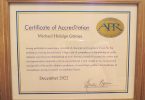PR professionals who do not have their APR are often as passionate arguing against it as those who have attained Accreditation argue for it. These are not new positions in our profession. When I decided to get my Accreditation way back in 1995, such arguments were raging around me. Twenty-two years later, though, I am as pleased with my decision to earn the credential as I was the day I passed the tests.
One can be successful in our profession without an APR, or a master’s degree, or even a degree in the academic disciplines most associated with the practice of public relations. I suppose there can be equally strong arguments for and against getting those credentials, but I didn’t pay attention to either argument. I consider myself a lifelong learner because I want to be the best I can be in my profession. Any opportunity to enhance my skillset interests me, whether or not I can definitively prove a pocketbook ROI for my time and money.
APR is not simply another professional development workshop or a one-time training program. An APR is a commitment to our profession — different from many other one-time learning opportunities because once the credential is earned, it must be maintained. I also wanted a competitive differentiator to give potential employers a tipping point to pick me over another candidate.
As with many learning experiences, I found the journey toward obtaining my APR a worthwhile ride. My study group was supportive (I am still in touch with many of them) and our professional adviser was encouraging. The Examination for Accreditation in Public Relations was challenging, but with the proper preparation I found no surprises and passed on my first attempt. Had I not passed, I knew the supportive network that helped me prepare would be available if I wanted to attempt it again.
As a passionate member of PRSA, I’ve found the credential helpful as I’ve ascended into various leadership roles in Chapters, a District and national posts. I am proud of my APR and encourage anyone considering earning the credential to go for it.
For more information about the Accreditation in Public Relations process, visit www.praccreditation.org.
Richard J. Batyko, APR, Fellow PRSA, has been practicing public relations for 30 years in Fortune 500, nonprofit and philanthropic organizations. He is a member of PRSA’s Board of Directors and an adjunct professor in Kent State University’s Master of Public Relations program.








Having had the APR for many years and been involved in readiness reviews, APR test question development and technical reviews, etc. – my take on the reason that anyone in the public relations profession as a career who doesn’t obtain it is more about the (public) embarrassment of failing either the readiness review or the exam. Or more simply – a candidate sitting through a readiness review performed by APRs who may have less professional experience than the candidate.
That’s why I don’t think you will ever see senior practitioners or agency heads going for their APR.
And you will hear all the excuses in the world.
I think the accreditation organizations might acknowledge this by having a “senior practitioner” APR track where the instruction, mentoring and readiness reviews are conducted by senior practitioners only. There will still be the ego issue for some candidates, but the excuse (which is never stated) of being evaluated by junior people will no longer be one of them.
Also, PRSA and the other organizations have to put more effort into promoting the APR and persuading employers (be it corporate or agencies) to make it a hiring criteria.
Right now it isn’t and the emphasis isn’t there. I was stunned recently to find that my local chapter had their first two new APRs in five years! There’s something wrong there.
Thanks, Richard! I earned my APR in 1994 and am so glad I did. It is our industry’s professional certification and well worth the effort.
Appreciate your perspective on Accreditation, Rick! Informed and incisive.
Rick, thanks (rather belatedly) for this perspective. I earned my APR in 1998, and I am very proud of it. I use the initials in all cases (professionally), and I am happy to explain what it means to anyone interested–and maybe a few who aren’t–haha! Like you, I see Accreditation as a commitment to my profession as well as having been a great learning experience. I continue my learning process by taking part in Readiness Reviews as well as any workshops or webinars offered by our local chapters (we have PRSA as well as a regional PR organization here).
I also heartily agree with Jeffrey’s comment that PRSA and other groups need to put more effort into promoting the APR on the business/employer side. I feel like a broken record saying it, but until many more employers start recognizing this credential, it will continue to be a personal achievement rather than a true professional certification.